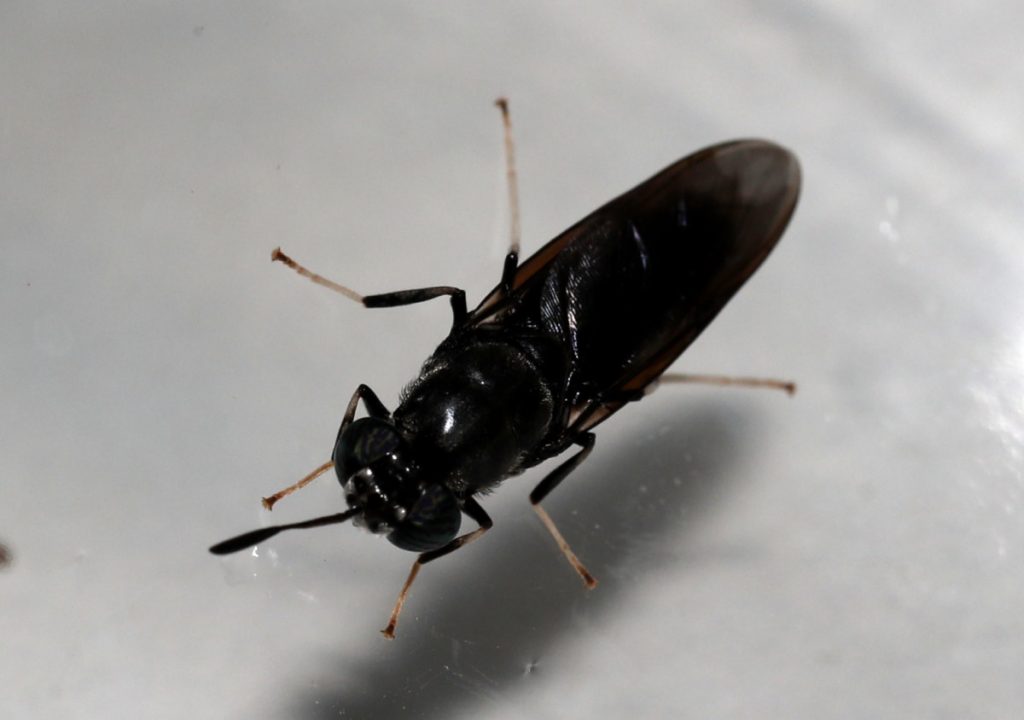このページを 日本語 で読む
The Futaba Sankyo Corporation has launched a feasibility study on the commercialization of fish feed made from the black soldier fly. Headquartered in Higashi-Hiroshima City of Hiroshima Prefecture, Futaba Sankyo's main business is fermenting food residues into compost.
The project is underway in collaboration with the University of Tokyo, the University of Human Environments (Okazaki, Aichi Prefecture), and the National Agriculture and Food Research Organization (Tsukuba, Ibaraki Prefecture).
Fish Feed Alternative
The black soldier fly (Hermetia illucens) is a species native to North America. An adult soldier fly measures approximately 2 cm in length. The insect is believed to have entered Japan after World War II and can be found all over the country, excluding Hokkaido.
The larvae grow in warm climates and feed on household food waste. They reproduce in the summer when temperatures are high. Adult flies pose no threat to humans or livestock and do not sting. Due to the amount and quality of the nutrients they contain, the larvae are used in pet foods made for reptiles and amphibians.
In recent years, research has been conducted worldwide on the usability, safety, and industrialization of black soldier fly larvae as feed in fish and poultry farming.
Background: The Global Protein Crisis
In the backdrop of growing interest in the black soldier fly is the threat of a global protein crisis. The world's population continues to grow and is projected to reach 10 billion by 2050. As early as 2025 or 2030, a protein crisis could arise in which the human demand for protein exceeds supply.
Among various types of protein, fish are a major source of protein for humans. But consumption is increasing worldwide. Meanwhile, the price of fishmeal feed for aquaculture is rising, making it harder to obtain.
A report published by the Food and Agriculture Organization (FAO) in 2013 first triggered the alarm about this issue. The report examined insects as a future source of food for humans and feed for animals.
While insects have long been eaten as food in Asia and Africa, this practice is almost non-existent in the West. The report discusses the breeding of insects in warm climates as a safe food and feed source to address potential food shortages and a protein crisis.
Around the same time the report was published, research on insect breeding in Southeast Asia and the commercialization of edible insects as meat substitutes became active, particularly for black soldier flies.
Triple-Helix Research
A main component of Futaba Sankyo's business is fermenting kitchen waste and other food residues into compost. Seeing the black soldier flies that came in with food waste, the company decided to launch a research project. The project's aim is to determine the feasibility of applying the company's know-how to breeding flies.
Futaba Sankyo put in a request for research support to the National Agriculture and Food Research Organization (NARO). From there, the company was introduced to Professor Masami Shimoda of the Graduate School of Agricultural and Life Sciences at the University of Tokyo, an authority on applied entomology. Professor Shimoda in turn introduced Professor Shinsuke Morioka, an expert in aquaculture at the Faculty of Environmental Science of the University of Human Environments. The research got off the ground as a collaboration between industry and academia.
Subsequently, the project was selected for a subsidy from Hiroshima Prefecture through a scheme to promote environmental and energy industries. Thus, a triple-helix research project was established based on collaboration between industry, academia, and government.
Safety and Food Security
To prove the usability of feed made from black soldier flies, Futaba Sankyo will compare data on the growth of Japanese catfish reared on fishmeal feed with those reared under conditions in which the black soldier fly is added to feed.
Professor Morioka commented on the choice. "Starting with a relatively small freshwater fish suited to feed made from soldier flies, compared to larger saltwater fish that requires large amounts of feed, is appropriate for a small-scale study like this one," he explained.
Research and businesses on developing the black soldier fly as feed are thriving around the world. As such, a system for traceability is needed to ensure the safety of the feed if it is to be widely distributed to livestock and fish farmers.
"Japan lags behind other countries in research on insect feed. Promoting domestic research plays an important role in avoiding dependence on specific regions for food. Take the stagnating grain distribution due to the war in Ukraine as an example," Professor Shimoda noted. "However, there is also the issue of labor costs, which are higher in Japan than overseas. Keeping production costs down will also be a focus," he added.
Adding Value
Futaba Sankyo aims to add new value to its composting process by breeding soldier flies from the food scraps already handled by the business.
By reusing food scraps, the company could reduce the environmental burden of the process, as less food and water would be needed to rear the flies. In addition, Futaba Sankyo is looking into applications for the oil extracted from soldier fly larvae (biodiesel, cosmetics, etc.). Expectations are high for the results of this joint research.
(Futaba Sankyo is a Content Partner of Japan 2 Earth.)
このページを 日本語 で読む
